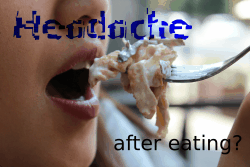Headache After Eating? Common Causes and Fixes
It’s not uncommon to get a headache after eating, but it’s certainly not something you should ignore. The causes and the symptoms can be serious enough to affect your life in a big way.
These types of headaches can vary – pressure between the eyes, throbbing on one side of the head, a tight feeling … and each headache may have a different source.
There is not always a simple cause and effect relationship. Eating can cause some complex changes in the body, depending on what you eat, how much, and when. Some researchers have called the gut a “second brain”, because of the somewhat independent and complex way that it sends signals to the rest of the body.
If you’re experiencing headache after eating, here are a few things to investigate:
- Headache Triggers: It is possible that certain foods are triggering neurological changes in your body which lead to migraine attacks. Migraine may or may not involve a headache, and the headache may vary in severity. However, if the pain is throbbing and you’re sensitive to light and/or sound, it’s very likely that migraine is involved. Talk to a doctor about your symptoms, and start keeping a diary including symptoms and foods you have eaten.
- Sugar Levels: Changes in sugar levels may be triggering migraine attacks or they may also lead to other types of headache (see Sugar and Migraines?). Symptoms may also include anxiety, weakness, and lightheadedness. In many cases, extreme highs and lows in sugar levels can be avoided by eating regularly throughout the day, eating balanced meals and avoiding refined sugars and flours. However, if the headaches persist, your doctor can run some tests and try to track down the problem. This may be more common in people who are underweight.
- Food Allergies or Intolerance?: There is a generally accepted definition of a food allergy, which is an immune reaction that occurs soon after you eat, often involving itching or hives, headache, nausea, and/or trouble breathing. Things get more controversial, however, when we start talking about food intolerance and “delayed” food allergies. Skin or blood tests are sometimes used for allergies, but they may not show other types of intolerance. Common substances that may trigger headache (including, but not necessarily, a headache from migraine disease): alcohol, MSG and related additives, and artificial sweeteners.
There are certain things that are unlikely to cause headache after eating, such as hypertension. This is a belief that has been circulated on the internet, but a headache from high blood pressure is extremely rare, and is a medical emergency.
However, this is not to say that blood pressure is in no way related to headache, and it is not to say that salt may not be involved.
Many of us do eat too much salt, and there is a correlation with more headaches. In many cases, salty foods are also laced with MSG (see above).
So what can I do about these headaches? Here are the top suggestions:
- See your doctor: It is not normal to get a headache after eating. See your doctor and explain your symptoms to her, before relying on painkiller which may only make the problem worse and are unlikely to address the underlying cause.
- A healthy diet: For most of the causes of this type of headache, a healthy diet is actually the answer. Watch out for refined foods, especially sugars and artificial sweeteners, refined flours, and additives. Eat regularly, and don’t consume a lot of sugary or alcoholic drinks without eating something healthy at the same time.
- Stay hydrated: You can actually overdo this one. However, you should be drinking liquids throughout the day and during/after meals. Sugary drinks (including juices) should be rare. Water is your friend.
- Elimination diets: There are a number of diseases and conditions which could trigger headache after eating. Depending on what your doctor suspects from your symptoms and medical history (you’ve been to see your doctor, right), she may suggest eliminating gluten, or aged foods (many cheeses), nuts, caffeine, or other common suspects. Again, keeping track of what you eat is key here.
- Check the environment! Sometimes the cause is something you would never think of. The lighting or air circulation in the place you always go to eat, for example. Heating foods up in plastic containers. Think about the environment and things that are always there when/before the headache strikes.
We all want a simple solution, but in this case the solution may take some time to track down. Do make sure your doctor takes your headache seriously, be patient, and in most cases you can cut down on or eliminate the headaches with some trial and error.

24 February 2016 @ 11:28 pm
Home Remedies to Stop Headaches after Eating:
Massage, Meditation, yoga, or relaxation, Cold compress, Aspirin, Lavender.
6 March 2018 @ 1:39 pm
immediate counter-measure: dark chocolate. Works after a few minutes. Else take a bit more.
11 March 2018 @ 10:03 am
Last year I was diagnosed with a very mild Gluten Intolerance. There have been several times when I’ve gotten a headache or stomach cramps after eating dinner. I really haven’t paid attention to it until recently. Seems every time I eat dinner I get a throbbing headache that some times turns into a migraine. I don’t really eat a meal for breakfast or lunch, it makes me feel like crap for the rest of the day. Instead I snack on veggies and Gluten Free Rice Cakes. And have no symptoms. Could it be my “Mild Gluten Intolerance” has gotten significantly worse?